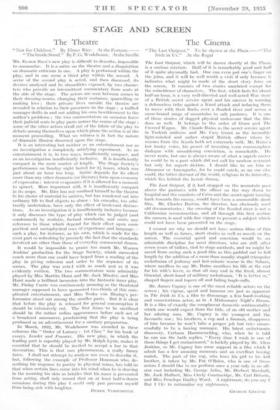STAGE AND SCREEN
The Theatre
"Not for Children." By Elmer Rice. At the Fortune.-- " The Inside Stand:" By P. G. Wodehouse. At the Saville 111n. EmnPtRICE's new play is difficult to describe, impossible to summarise. It is a satire on the theat re and a disquisition on dramatic criticism in one. A play is performed within the play, and in one scene a third play within the second. A scene of the second play is acted, and then discussed, its devices analysed and its absurdities exposed, by two charac- ters who provide an intermittent commentary from seats at the side of the stage. The actors are seen between scenes in their dreSsing-rooms, changing their costumes, quarrelling or inaking love ; their private lives outside the theatre are revealed in relation to their presences on the stage ; a baffled manager drifts in and out adding his own bewilderment to the author's problems ; the two commentators on occasion leave their judicial seats to play parts nearer the centre of the stage ; some of the. other actors stroll out of the fabric of the play to debate among themselves upon which plane the action is at the moment proceeding. What we witness is in fact the nature of dramatic illusion' dissected upon the stage.
It is an interesting but neither as an entertainment nor as an investigation a' completely satisfying experiment. As an entertainment it is, in two ways, insufficiently compact, and as an investigation insufficiently inclusive. It is insufficiently compact in the mere matter of length. The Stage Society's performance on Sunday night lasted for 8k hours, which was just about an hour too long. Satire depends for its- effect more than any other dramatic (or literary) form upon economy of expression ; interest evaporates if it is allowed for a moment to sprawl. More important still, it is insufficiently compact in its scope. Mr. Rice haS not confined himself to the theatre in his choice of material to satirise, but has wandered out into ordinary life to find objects to abuse : his crusades, too arbi- trarily undertaken, have only the effect of irrelevant distrac- tions. As an investigation it is insufficiently inclusive because it only discusses the type of play which can be judged (and condemned) by realistic, factual standards, and omits any reference to those which depend for their effect upon more poetical and metaphysical uses of experience and language— such a play, for instance, as' his own, which is made for the most part so refreshing by precisely the fact that the standards involved are other than those of everyday commercial drama.
It would be impossible to praise too much Mr. Warren Jenkins' production for the Stage Society, which succeeded much more than one could have hoped from a reading of the play in giving cohesion and order to the sequence of its scenes. The play was actei with as much zest as it was evidently written. The two commentators were admirably played by Miss Martita Hunt and Mr. Jack Minster, and Miss Hunt made a brilliant incursion into the fantastic inner play. Mr. Finlay Currie was continuously amusing as the theatrical manager supposed to have sponsored iwo-thirds of this coin- plicated entertainment, and Miss Toska von Bissing's per- formanee stood out among the smaller parts. But it is clear that before the play is released for general consumption it should be extensively cut. The 'first items -to be sacrificed should be the rather tedius appearances before' each act of a broadcast announcer, proclaiming that the play' is being. produced as an advertisement for a sanitary preparation.
In March, 1982, Mr. Wodehouse was awarded in these columns the " Order of Lunacy : 1st Class " for his book of essays, Louder and Funnier. His new play, in which the leading part is superbly played by Mr. Ralph Lynn, makes it essential that he should be invited to accept a bar to that decoration. This is that rare phenomenon, a really funny farce. I shall not attempt to analyse nor even to describe it, but, following the example of Professor Housman who, de- scribing his response to poetry in physical terms, haS told 'us that when certain lines come into his mind When he is'shaVing in the morning his skin so bristles that his razor is prevented from acting, shall only record that on at least half-a-dozen occasions during this play I could only just prevent myself frOm being sick with laughter.
DEREK VERSCTIOYLE












































 Previous page
Previous page